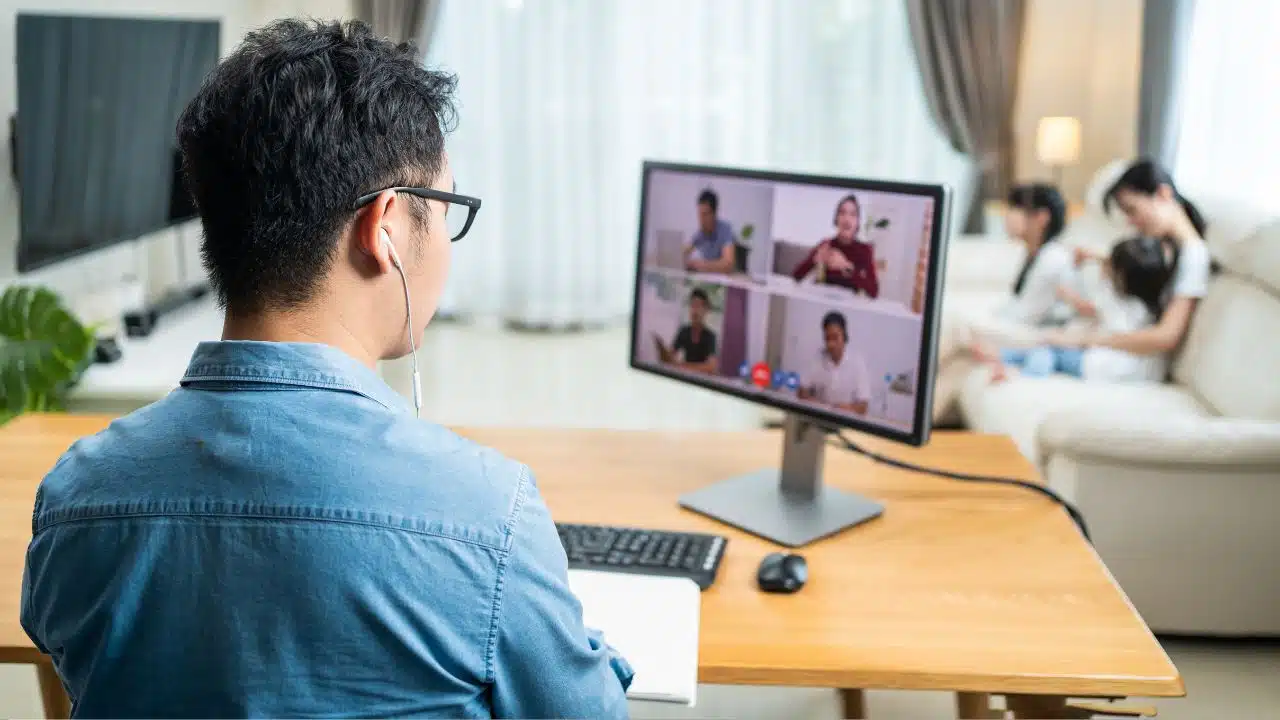The shift towards working from home has transformed how we approach our careers, offering unparalleled flexibility but also presenting unique challenges. This transition dramatically affects work-life balance, productivity, and even our mental health. Many grapple with finding the right balance between remote work’s freedom and the potential for isolation and burnout.
With the right strategies, you can reap the benefits of working from home while mitigating the downsides.
But what are the pros and cons of working from home, and how can you decide if it’s right for you?
Pro: Flexibility in Work Schedule

One of the biggest upsides of remote work is having the flexibility to arrange your hours to maximize productivity. Without adhering to an office’s rigid 9-5 schedule, you can shift your workday to match your personal flow and energy levels. This leads to less stress, better rest, and increased job satisfaction.
A flexible schedule also makes it easier to fulfill family responsibilities and personal errands that can be difficult with an inflexible office routine. Having control over your daily agenda is invaluable for achieving a healthy work-life integration.
Con: Overworking Risks

Remote employees tend to log longer workdays on average without having to adhere to fixed office hours or commute home. While some overtime here and there won’t hurt, regularly overworking can take a major toll both physically and mentally over time.
Staring at screens for 10+ hours leads to eye strain, back pain, and other ergonomic issues. It also increases stress, disrupts sleep schedules, and hinders people from carving out time for healthy food prep and exercise.
Setting clearly defined work hours and being disciplined to step away from the computer is essential. Regular screen breaks, standing desks, and ergonomic equipment can also offset potential health impacts. However, conscious time management is key to preventing overwork.
Pro: Customizable Workspace

A major benefit of remote work is the freedom to perfectly arrange your physical workspace to suit your needs. You can set up an ergonomic workstation without being bound to a cubicle or shared office with your ideal lighting, temperature, and ambient noise level.
This ability to customize also applies to the digital space, with freedom over the devices, operating systems, software programs, and browser extensions you use. By tailoring a home office environment to your exact preferences, you remove workplace distractions and friction that hampers productivity. The comfort and familiarity lead to your working more efficiently.
Heck, you can even work remotely while traveling, which many people do. You could be plugging in from a luxury travel trailer as you go on a cross-country trip – the flexibility of your workspace is amazing.
Con: Distractions at Home

While having flexibility over your home work environment is a major advantage, it can also lead to decreased productivity if you don’t take steps to minimize distractions. When the fridge, TV, pets, kids, household chores, and naptime are just a few feet away, it takes real self-discipline not to wander.
Baking a rye sourdough loaf for dinner in the middle of the day? You can absolutely do that before jumping into a meeting. But you can’t make risotto or prepare a five-course meal.
Designating a dedicated home office space can help psychologically set boundaries. Noise-canceling headphones and apps that limit access to distracting websites also help you stay focused on work tasks. Ultimately, though, avoiding distractions comes down to self-control.
Pro: Global Job Opportunities

Remote workers who don’t have geographical restrictions can access employment opportunities more easily. Digital connectivity enables them to work for companies located anywhere in the world while living wherever they want.
This global job market allows you to find the ideal role that matches your niche skills, career aspirations, and salary expectations. It also provides options to relocate without having to switch jobs. And for employers, the expanded talent pool gives access to specialists that may not exist regionally.
Ultimately, the barriers that previously confined candidates and companies to hiring within a local area evaporate with remote work.
Con: Lack of Social Interaction

We are social creatures by nature, so the isolation of working alone at home can present emotional challenges for some people. Without the camaraderie of chatting around the office water cooler or going out to lunch with colleagues, it’s easy to feel lonely.
Remote workers need to make an extra effort to get social interaction through after-hours video calls with co-workers, attending virtual office events, or joining local networking groups. Having an external professional network is key to avoiding potential feelings of being socially isolated.
Pro: Savings on Commute and Dress Code

Working from home alleviates many daily expenses associated with commuting to a workplace and conforming to a professional dress code. Remote employees can save hundreds of dollars per month by avoiding fuel, vehicle maintenance, public transport, or rideshares.
The cost benefits also extend to professional attire. Relaxed or non-existent dress codes allow you to wear casual, comfortable clothing instead of dry-cleaning pressed shirts and suits. This saves you money, time, and effort associated with preparing, commuting, and conforming to office wardrobe expectations.
Balancing the Pros and Cons

Working from home offers alluring benefits like flexibility and comfort. However, without proactive strategies, it also poses unique challenges impacting performance and well-being.
Achieving work-life balance requires diligent self-discipline when your office is so conveniently at home. But there are things you can do to take advantage of the upsides of remote work.
Create an Ergonomic Home Office

Carving out a dedicated workspace within your home is a vital starting point for effective remote work. Choose a quiet, distraction-free area and invest in ergonomic office furniture and equipment.
An adjustable standing desk, quality chair, external monitors, and keyboard allow you to work comfortably for extended periods. Ensure proper lighting, ventilation, and ambient noise levels to encourage focus. Decorate it professionally to psychologically set it apart from living spaces.
When everything is neatly organized to support productivity, you’ll be motivated every time you sit down to work.
Establish Daily Routines and Boundaries

Without firm boundaries, the office can blend into home life. You need structure.
Set a consistent sleep schedule aligned with your natural rhythm and establish a morning routine for waking up intentionally. Maintain regular work hours and break times as if commuting to a corporate office. Resist doing household chores during work blocks and silence personal phone notifications to avoid distractions.
At the end of the workday, set a routine for winding down. Changing into loungewear, turning off work devices, and shifting locations help signal closure. Routines and rituals reinforce the separation between work and personal life.
Use Productivity Tools

Staying disciplined and connected is much more achievable with the right toolkit catered to your work style. Many apps and gadgets can optimize efficiency when collaborating with remote teams:
- Communication platforms like Slack and Zoom facilitate instant messaging and video meetings to align efforts.
- Time tracking software provides visibility into how you spend your hours.
- Noise-canceling headphones and website blockers minimize distracting sounds and sites.
- Project management tools like Asana or Trello give structure for managing individual and team workflows.
While an array of solutions exists for nearly any productivity obstacle faced, be strategic about adoption. Evaluate their efficacy with free trials first, and only utilize technology that serves your unique needs.
Working from Home is Awesome, But It’s Not for Everyone

Embracing the flexibility and opportunities offered by working from home can lead to significant personal and professional growth. Yet, it requires a conscious effort to mitigate potential drawbacks such as isolation and overwork.
Ultimately, the key to a successful remote work experience lies in finding balance—leveraging the advantages for productivity and well-being while taking proactive steps to remain connected and maintain boundaries. As we continue to adapt to this new normal, embracing the pros of remote work can create fulfilling and efficient work environments, wherever they may be.
Signs Your Home Office Sucks (And How to Fix It)

Not all home offices are created equal. While some provide a productive and comfortable work environment, others can be far from ideal, leading to decreased efficiency, motivation, and overall job satisfaction. Here are six telltale signs that your home office may not be up to par and how to transform it.
Self-Discipline Tips for Remote Workers

Self-discipline isn’t about rigid rules or chaining yourself to a desk; it’s about unlocking the freedom to thrive wherever you work. These small habits will help you overcome procrastination and teach you to be more in control when working from home.
Natasha Krajnc
Hi! My name is Natasha and I'm specialized in home sourdough bread baking and currently based in Slovakia - a very small country in Central Europe.
My bread baking story began in 2011 when I decided to give up commercial yeast. I felt tired all the time (especially after eating bread and other foods made with yeast), I wasn’t motivated to do anything, had trouble concentrating throughout the day, my abdomen was bloated and I was like a trumpet on steroids – basically, I was quite a wreck. I was a big bread lover (and still am) and having to stop eating bread was quite hard at that time but I felt I was on a right way to give my body a chance to heal itself.
